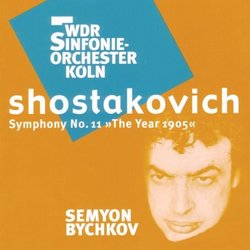A fast, no-nonsense reading that minimizes the score's hollo
Santa Fe Listener | Santa Fe, NM USA | 09/19/2007
(5 out of 5 stars)
"Shostakovich spent so many decades deceiving and sidestepping the Soviet terror machine that he never lost the habit of covering up his true intentions. Ostensibly the Sym. #11 was a patriotic pictorial written to celebrate the Soviet state through the eyes of an earlier unsuccessful uprising against the Czar in 1905. The work is his most populist "big" symphony, full of easy tunes and cinematic clashes between suffering peasants and a cruel ruler. In retrospect suggestions have been made that the cruelty depicted is Stalin's instead.
As pure music, much of the score is on the level of movie music, and Bychkov seems to sense a heavy layer of insincerity. Like every other conductor, he has to thread his way through the Eleventh's moments of glib, even oily sentimentality. Bychkov's strategy is to refuse to linger over the melodrama, to bring down to scale all the overblown intentions that make the Eleventh seem hollow. Stokowski took the opposite tack in his famous recording from Houston (on Everest), magnifying the score's vulgarity to the point that it crossed the line and became pop epic.
For me, bychkov has taken the more convincing approach, but I should admit that I find the Eleventh hard to swallow. Getting past the fake rhetoric works for me, while true devotees may feel that Bychkov isn't taking the patriotic pageantry seriously enough. The finale is actualy cheeky rather than menacing. For bone-crunching melodrama one can turn to Rostropovich and the London Symphony; for searing intensity to Mravisnky on various Russian reissue labels. I think Bychkov gives the cleanest, non-nonsense traversal."

